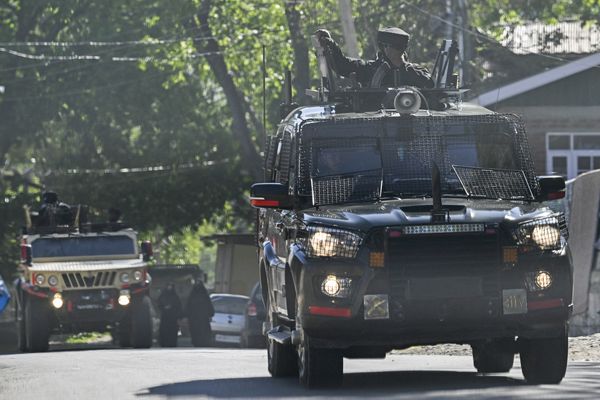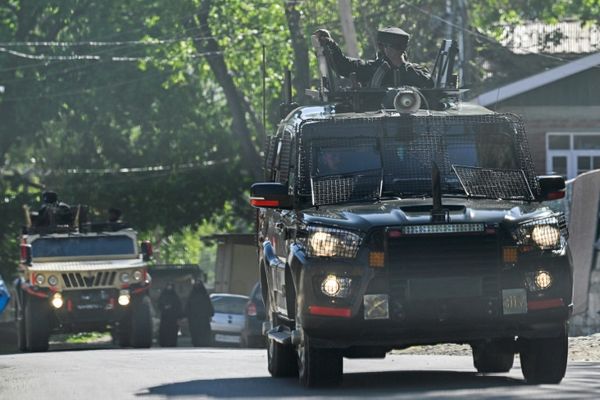One of the most poignant images of the U.S. defeat in Vietnam was sailors dumping aircraft into the sea. More evacuation flights were approaching the U.S. fleet from Saigon than American ships had room to hold, so sailors had to push helicopters overboard to make room for incoming airlifts.
On Monday, the U.S. military made a similar maneuver, but entirely by accident. While trying to escape from a Yemeni missile and drone attack, the U.S.S. Harry Truman veered so hard that a F/A-18E Super Hornet fighter jet fell from the aircraft carrier into the Red Sea, the U.S. Navy informed CNN. None of the crew were harmed, except for a sailor who suffered "minor injuries," according to the Navy's statement.
Although the cost of the Super Hornet has changed over time, the Navy recently bought 17 of them for $1.1 billion, making for a cost of around $64 million per warplane. And this F/A-18E was the second one lost to the war in Yemen. Last December, the U.S.S. Gettysburg accidentally shot down one of its own fighters shortly after it took off.
And in January 2024, two Navy SEALs slipped and drowned while trying to board a cargo boat allegedly smuggling Iranian-made missile parts to Yemen.
The campaign against the Houthi movement in Sanaa, one of Yemen's two rival governments, has been criticized for its wastefulness. It cost $3 billion in just the first three weeks. But money is not the only issue. The wars in the Middle East are sucking up scarce physical resources that the U.S. military wants to station near China instead. A senior Pentagon official warned Congress that U.S. Indo-Pacific Command was "risking real operational problems" as a result of the Yemeni crisis.
During the first night of U.S. air raids in January 2024, the Navy used up a year's production of Tomahawk missiles. "Are they stopping the Houthis? No. Are they going to continue? Yes," then-President Joe Biden told reporters shortly after.
Houthi attacks on shipping (and U.S. attacks on Yemen) paused in late January 2025, with the Israeli-Palestinian ceasefire. President Donald Trump resumed the Yemeni war in March, promising to end the Houthi campaign of "piracy, violence, and terrorism" once and for all. His hawkish national security adviser, Mike Waltz, promised to go further than Biden's "feckless attacks," though the administration wouldn't name any of the Houthi leaders it claimed to have killed.
The new stage of war comes at a severe cost to bystanders. At least 158 civilians have been killed in Yemen by U.S. air raids since March 15, reports The Guardian. On Sunday, a U.S. bomb hit an immigration detention center in Yemen, killing potentially dozens of African migrants. Although the U.S. military publicly claimed that it didn't have information on civilian casualties, Waltz was privately bragging about bringing down a building on innocent bystanders, according to leaked chat logs.
At first, the Trump administration denied that it was looking for regime change in Sanaa. "We don't want a long, unlimited war in the Middle East," Secretary of Defense Pete Hegseth told Fox News on March 16. "We don't care what happens in the Yemeni civil war. This is about stopping the shooting at assets in that critical waterway."
But earlier this month, The Wall Street Journal reported that the U.S. was considering backing a full ground invasion of Houthi territory by the rival Yemeni government in Aden. The plan was being pushed by the United Arab Emirates, which invaded Yemen alongside Saudi Arabia in 2015 to prop up the Aden government, according to the Journal.
The war in Yemen is tied to two other U.S. interventions in the Middle East: the Israeli-Palestinian conflict and the nuclear standoff with Iran. The Houthis began their attacks on foreign shipping in response to the war in Gaza, and began attacks on Israel itself, vowing to continue as long as the war did. They held up the promise, pausing operations as long as the ceasefire was in effect.
The escalation also came while Trump was trying to negotiate with Iran over its nuclear program, which the U.S. has been threatening to bomb since the Bush administration. Both Trump and Waltz's public statements on Yemen referred heavily to Iran, and the U.S. government-funded Radio Liberty reported that Trump was using Yemen to "show [Iran] that he is serious" about the threat of military force.
Direct U.S.-Iranian talks have since begun, and both sides are sending out positive signals. Iranian Foreign Minister Abbas Araghchi told reporters last week that he is "satisfied with the process" of the "serious and businesslike" talks, despite disagreements that still haven't been resolved. He later accused Israeli Prime Minister Benjamin Netanyahu, who has been warning Trump against a "bad deal," of trying to "sabotage" diplomacy.
"I think a deal is going to be made there. It's going to happen. Pretty sure it's going to happen," Trump told reporters on Sunday. "We'll have something without having to start dropping bombs all over the place."
But in Yemen, that's exactly what he's been doing—dropping bombs all over the place.
The post U.S. Navy Accidentally Throws $64 Million Jet Overboard Off the Coast of Yemen appeared first on Reason.com.







